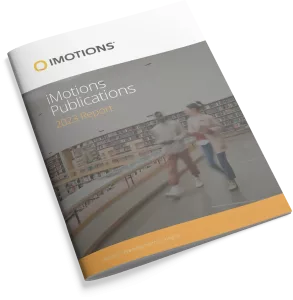-
Rhetorical strategies and emotions in political marketing management
Abstract: Purpose The purpose of this paper is to analyze how political marketing management in terms of communication practices influence the voters’ emotional responses as they observe and listen to the discourse of a political leader. Design/methodology/approach An experiment was conducted, in which participants watched the last debate of the campaign leading up the Peruvian […] -
Factorized Multimodal Transformer For Multimodal Sequential Learning
Abstract: The complex world around us is inherently multimodal and sequential (continuous). Information is scattered across different modalities and requires multiple continuous sensors to be captured. As machine learning leaps towards better generalization to real world, multimodal sequential learning becomes a fundamental research area. Arguably, modeling arbitrarily distributed spatio-temporal dynamics within and across modalities is […] -
Native Advertising in Online News: Trade-Offs Among Clicks, Brand Recognition, and Website Trustworthiness
Abstract: Native advertising is a type of online advertising that matches the form and function of the platform on which it appears. In practice, the choice between display and in-feed native advertising presents brand advertisers and online news publishers with conflicting objectives. Advertisers face a trade-off between ad clicks and brand recognition, whereas publishers need […] -
Panic Attack: How Illegitimate Invasions of Privacy Cause Consumer Anxiety and Dissatisfaction
Abstract: This research fills a gap in the literature regarding face-to-face privacy invasions. Most research in the privacy arena examines information privacy (e.g., credit card and data information) and ignores the privacy component of face-to-face interactions. Using three studies, the authors explore the impact of physical and visual invasions on privacy control. The findings show […] -
Brand Visual Eclipse (BVE): When the Brand Fixation Spent is Minimal in Relation to the Celebrity
Abstract: This study investigates overshadowing effect of a celebrity. A term brand visual eclipse (BVE) is coined, the BVE occurs when brand fixation spent is minimal of the celebrity fixation spent. High BVE occurs when brand receive less than or equal to twenty percent fixation spent of the celebrity; moderate BVE occurs when the brand […] -
Search Results Viewing Behavior vis-à-vis Relevance Criteria
Abstract: We conducted a lab-based experiment to investigate relationship between multiple criteria used in information relevance judgments and eye fixation behavior on search engine results. We collected eye-tracking data and conducted gaze-cued retrospective think-aloud (RTA). Data from RTA was coded with criteria used by participants in judging search results as relevant. The criteria were analyzed […] -
Effect of Feedback on Users’ Immediate Emotions: Analysis of Facial Expressions during a Simulated Target Detection Task
Abstract: Safety-critical systems (e.g., UAV systems) often incorporate warning modules that alert users regarding imminent hazards (e.g., system failures). However, these warning systems are often not perfect, and trigger false alarms, which can lead to negative emotions and affect subsequent system usage. Although various feedback mechanisms have been studied in the past to counter the […] -
The effect of food anticipation on cognitive function: An eye tracking study
Abstract: By randomizing the order in which participants perform a cognitive test and a food choice task in a controlled experiment, we investigate whether cognitive capacity can be enhanced by the simple act of anticipating food intake. Our findings show that overweight and obese participants exhibit an anticipatory food reward effect, which helped enhance their […] -
The Cognitive Dimension and the Affective Dimension in the Patient’s Experience
This article deals with the experience of the specific client of health services, that is, the patient. Satisfaction questionnaires are usually applied to assess patient experience. However, this tool provides only a cognitive evaluation; it does not afford an affective dimension of the experience. The objective of the present study is to verify the relationship […] -
Emotional expressions associated with therapeutic inertia in multiple sclerosis care
Abstract BackgroundEmotions play a critical role in our daily decisions. However, it remains unclear how and what sort of emotional expressions are associated with therapeutic decisions in multiple sclerosis (MS) care. Our goal was to evaluate the relationship between emotions and affective states (as captured by muscle facial activity and emotional expressions) and TI amongst […]
Research Report 2024
In-depth look at the scientific landscape as powered by iMotions software, showcasing groundbreaking research and the impact of our tools in various scientific and industrial fields.

iMotions Science Resources
Looking for white papers, validation reports or research show casing iMotions Multimodal capabilities?
Share Your Research

850+ universities worldwide with an iMotions human behavior lab
73 of the top 100 highest ranked universities
710+ published research papers using iMotions
iMotions is used for some of the most interesting human behavior research studies carried out by top researchers around the world. Contact us to have your publication featured here.
The authors of these publications have used iMotions as a software tool within their research.
“Software should be cited on the same basis as any other research product such as a paper or a book; that is, authors should cite the appropriate set of software products just as they cite the appropriate set of papers” (Katz et al., 2020).
We therefore encourage you to cite the use of iMotions where appropriate.
How to cite iMotions
APA
iMotions (10), iMotions A/S, Copenhagen, Denmark, (2024).
Note: adjust the version and year where relevant.
5 Most Popular Blogs
Learn How to Conduct Human Behavior Research with iMotions
Publications
Read publications made possible with iMotions
Blog
Get inspired and learn more from our expert content writers
Newsletter
A monthly close up of latest product and research news

